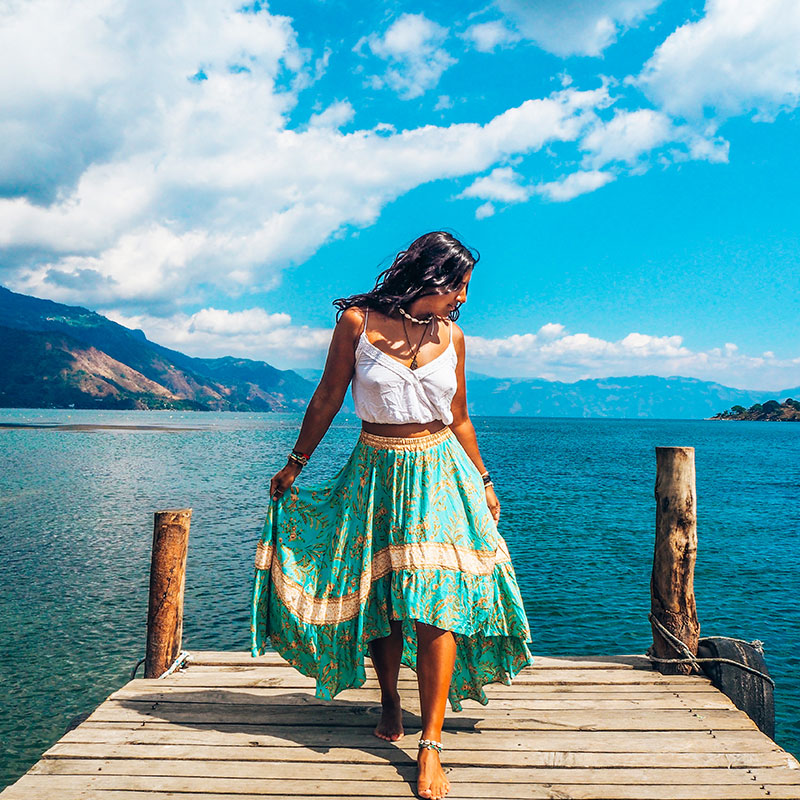*This travel sickness post is collaborative post with various brands
There's nothing worse than being struck down with travel sickness after you've spent all year counting down to cocktails by the pool. It's happened to all of us, and when you travel a lot, sadly it's all the more likely if you become tired and run-down. Whether it's Delhi belly, Bali belly, or even just a cold from the air conditioning on the plane – it can make or break a trip within hours. Nobody wants to be feeling ill in bed, or chained to the toilet, when they could be on the beach eating ice cream.
But the truth is, if you spend all year gearing up for your trip and then totally cut loose on holiday, your body is sure to feel the effects quickly. Going from one extreme to another can have a knock-on effect which makes you more vulnerable to getting sick when you're exposed to new germs. It's something nobody wants to think about, but by planning ahead and being a bit more aware, you could save yourself a lot of misery. I want to stress that I am in no way a medical professional, this guide is created from the experiences of a seasoned traveller. If you become sick while on holiday, you should always get medical advice from a trained professional.

Coping with the most common types of travel sickness
Motion sickness
What is it?
Motion sickness is a demon – only affecting some unlucky travelers, it can have a huge impact on how much you are able to enjoy your trip. From cars, to planes, to boats, there are so many ways for it to affect your holiday. While some may just feel a bit nauseous or dizzy, for others it can cause violent sickness and even anxiety at the thought of travelling.
How to prevent and treat it?
Affecting travelers in a variety of different ways – there are also a number of ways to ease the symptoms when you travel. For those who suffer mildly, you may find it helps to stare at a fixed point on the horizon, or even listening to music. A natural remedy is to try ginger tablets or eating raw ginger. Others may find sucking boiled sweets or "travel sweets" helps to settle their stomach. For those who suffer with more extreme cases, buy travel sickness medication to take 30 minutes before you travel. From someone who has tried this medications over the years, always buy non-drowsy because drowsiness can increase the feelings of motion sickness.
What to pack?
- A good playlist
- Ginger tablets or crystallized ginger
- Boiled sweets or travel sweets
- Travel sickness medication (non-drowsy)

Heatstroke
What is it?
Too much time in the sun can leave you feeling sick and feverish, dizzy with headaches and cramps. It's no fun when a day of sunbathing or exploring a new place leaves you with a touch of heat exhaustion, or even sunburn. It's important to remember – especially if you're from the UK – your body isn't used to being in the heat and may react differently to how you like. Take care of yourself and drink lots of water.
How to prevent and treat it?
Avoid getting sick at all by staying smart in the sun – wear sunscreen, drink lots of water and don't lay in the sun all day. Spend a few hours in the shade – especially at the hottest point of the day (usually around 11am to 3pm. Listen to your body. If you've been caught out in the sun, take a cool shower and spread aloe vera or after sun on your skin to help soothe it. Drink lots of water and try putting your legs up to let the blood flow and stop dizziness. Lay in a dark, cool room to recover. If you don't feel better within 30 minutes or lose consciousness, seek medical advice.
What to pack?
- Sunscreen (Factor 30+)
- Aloe Vera or After Sun
- Rehydration sachets are great if you are prone to heat exhaustion

Traveller's Diarrhoea
What is it?
The one no-one ever wants to talk about and yet the most likely one to affect your travels! Traveller's diarrhoea can be caused by a number of factors – but the most common is Enterotoxigenic E. coli. This can be caused by contaminated food, a virus such as norovirus, or even a parasite. These are mostly caused by poor standards of public hygiene and can commonly affect travellers particularly when travelling places like Asia. Everyone's heard of Bali belly, well it's very easy to get and no fun when you're surgically attached to the toilet.
How to prevent and treat it?
The best thing to do is avoid getting it altogether – but how do you do that? There are lots of simple precautions you can take:
- Don't drink the water! Do your research before you travel and stick to bottled water when told – that includes brushing your teeth.
- Avoid fresh salads and anything that could have been washed in contaminated water.
- Don't buy foods that have sat out, don't eat at buffets and don't eat anything the flies have been at.
- If you do get it – make sure to drink lots of water and try rehydration sachets to replace the salts and sugars your body needs.
- Get some sickness medication from the pharmacy to help slow your body down and reduce bowel movements. If it is going on for more than a few days, seek medical advice.
What to pack?
If you're looking for something that will help reduce the risk of getting traveller's diarrhoea –Travelan could be exactly what you're looking for. Particularly on your first visit to a high-risk environment, if your body is less used to travel or foreign cuisine, it's a great way to prepare your system for new germs. Travelan reduces the risk of occasional diarrhea and helps to target issues before they begin.
If you're travelling to somewhere like Bali or India, where sanitation levels are uncertain, this is a good way to look after your body. Why wait until you get sick? By taking a caplet of Travelan before each meal, the antibodies it contains will bind to any bacteria in the food rendering them powerless in their attempts to infect your bowels. Keeping your digestive health in peak condition from the beginning of your holiday, could mean avoiding an early ending to your trip.

Common Cold
What is it?
Everyone knows the common cold – it's no-one's friend and least of all when it pops up in the middle of summer! But if you're anything like me, you always pick up germs on planes. It doesn't seem to matter how much I travel, every long-haul flight sees me boarding healthy and feeling like I've got the flu by the time I arrive. It's something about the air conditioning sending the same germs around the same confined space. Feeling that same headache, watery eyes and sneezing, stuffed up nose is the worst, especially if you've just arrived on holiday.
How to prevent and treat it?
Sadly there aren't too many ways to avoid a cold, other than these two key things to remember:
- Wash your hands. Wash them regularly, wash them before eating, wash them before touching your face. Remember how many people will have touched all these airport surfaces before you. Carry anti-bac gel with you at all times.
- Make sure you're eating lots of fresh fruit and veg, keep your vitamin C levels high and maintain this throughout the journey and when you arrive at your destination.
What to pack?
- Cold and flu capsules/sachets
- Anti-bacterial gel
- Painkillers
- Tissues

Injury
What is it?
This could be anything from spraining your ankle to a motorcycle accident. When you've been planning the trip of a lifetime, you don't want to be stuck recovering in your hotel room in your travel slippers when you could be our having adventures! There isn't much you can do to prepare, other than be careful and try to stay safe. For basic first aid, it's always good to know how to clean and dress any cuts and scrapes. If you're prone to hurting yourself, it's worth carrying antiseptic spray in some areas such as Asia to avoid getting any infections. All other first aid items and wound dressings are available at the nearest pharmacy or health clinic.
How to treat it?
Always make sure any cuts, scrapes and wounds are cleaned carefully with alcohol or antiseptic. If these become infected and start to show pus, you should seek medical assistance. For larger wounds, head to the nearest doctor or hospital for assistance – you may need advice on whether to cover, or let wounds breathe.
What to pack?
- Antiseptic spray
- Plasters (band-aids)
- Medicare/EHIC or health card

How to stay healthy when you travel?
The best way to prevent illness is to focus on staying healthy when you travel and strengthening your body before you travel. These tips can help you fight off illness before it even has a chance to strike!
Give yourself a boost:
- Make sure you are up-to-date with your vaccinations
- Stock up on mosquito repellent and sunscreen – and USE them
- Eat where the locals eat – not in tourist restaurants/hotels
- Take probiotics in the weeks before you travel if you're prone to getting sick
- Drink lots of water (bottled)
- Eat a diet rich in vitamins, fresh fruit and veg, and maintain this when you travel
- Wash your hands and carry anti-bac gel
- Take Travelan before you eat
- Look into ear wax removal to help ease any hearing issues, pain or dizziness
Avoid like the plague:
- Don't drink the water, or brush your teeth with it
- No fresh salads or fruit washed in contaminated water
- Avoid ice in your cocktails
- Skip the buffet queue or any food that has been sitting out in the heat
- Be aware of flies and insects landing on food
- Don't buy medication that makes you drowsy, it can make travel sickness worse
What are your top tips for staying healthy and avoiding travel sickness?














